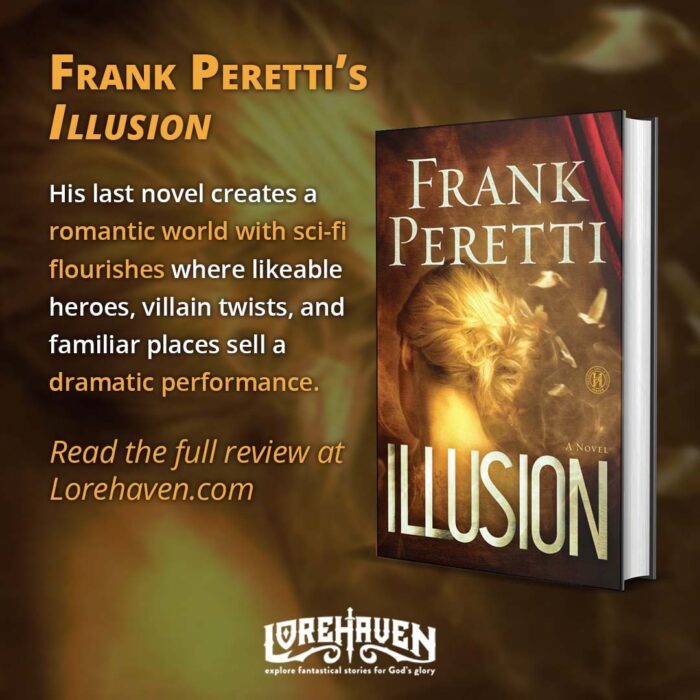Illusion
Frank Peretti’s apparent final novel Illusion released in 2012, but nearly vanished without a trace. To miss this tour de force would be a tragedy. Indeed, tragic loss begins the story of middle-aged Dane Collins, who by chapter 1 becomes a widower after a car accident kills his beloved wife Mandy. Unlike other Peretti heroes, Dane and Mandy are not pastors or police officers. They’re a popular duo in the magic arts—that is, show business, with flashing lights and Las Vegas and everything.
As our grieving husband tries to rebuild his retirement without his beloved of forty years, Mandy still lives in the past at age nineteen. Then in one blink-and-you’ll-miss-it moment, her perspective radically changes. With great time displacement comes great trauma, but also supernatural gifts to control space and alternate timelines. As Mandy forges a second life, Dane is startled by this teenager’s strange resemblance to his wife. Unknown enemies hold the answers, but their shadowy science could threaten Mandy’s life all over again, or worse, her future with Dane.
Just like that, the author who once imagined angel/demon wars instead blends The Prestige with The Time Traveler’s Wife (and even Tenet, years before it was made).
At a 2021 conference, Peretti himself remarked how Illusion seemed lost on many readers. Perhaps the premise felt too fantastical. Evangelical readers still expecting Peretti heroes to wield the power of prayer may have felt uncertain or alarmed by this new focus on stage magicians, one of whom performs actual levitations and psychokinesis. Patient readers can await more rational explanations, which Peretti in his own time provides in spades. Of course, mind you the wibbly-wobbly timey-wimey plot holes and predestination paradoxes. And don’t expect meditations on how mortals can gain power (like Peretti’s angels) to enter eternal in-betweens.
But this story isn’t about mad science or speculative multiversing. Peretti’s last novel creates a romantic world with sci-fi flourishes where likeable heroes, villain twists, and familiar places sell a dramatic performance.
Readers who overlook this Illusion risk the real-world wonders of an artist who has spent a lifetime cultivating the craft of Christ-exalting stories.
Best for: Older teen or adult readers who enjoy grown-up heroes as well as genre-blending supernatural drama with earnest romance.
Discern: Descriptions of violence, such as attacks on a young woman and memories of her older self’s tragic death; overt magical acts, like levitation and passing through walls, that are later explained by fictional science; older man is attracted to the nineteen-year-old version of his wife, a subject handled with sensitivity yet honesty; sporadic references to showgirl outfits and sensual appeal, but a usually more wholesome view of Vegas performers; one performance goes awry as one female magician is sexually assaulted by audience members, who are soon magically punished; several possible misuses of God’s title as exclamations (not as prayers).


































Have you read Illusion ? Share your own review.